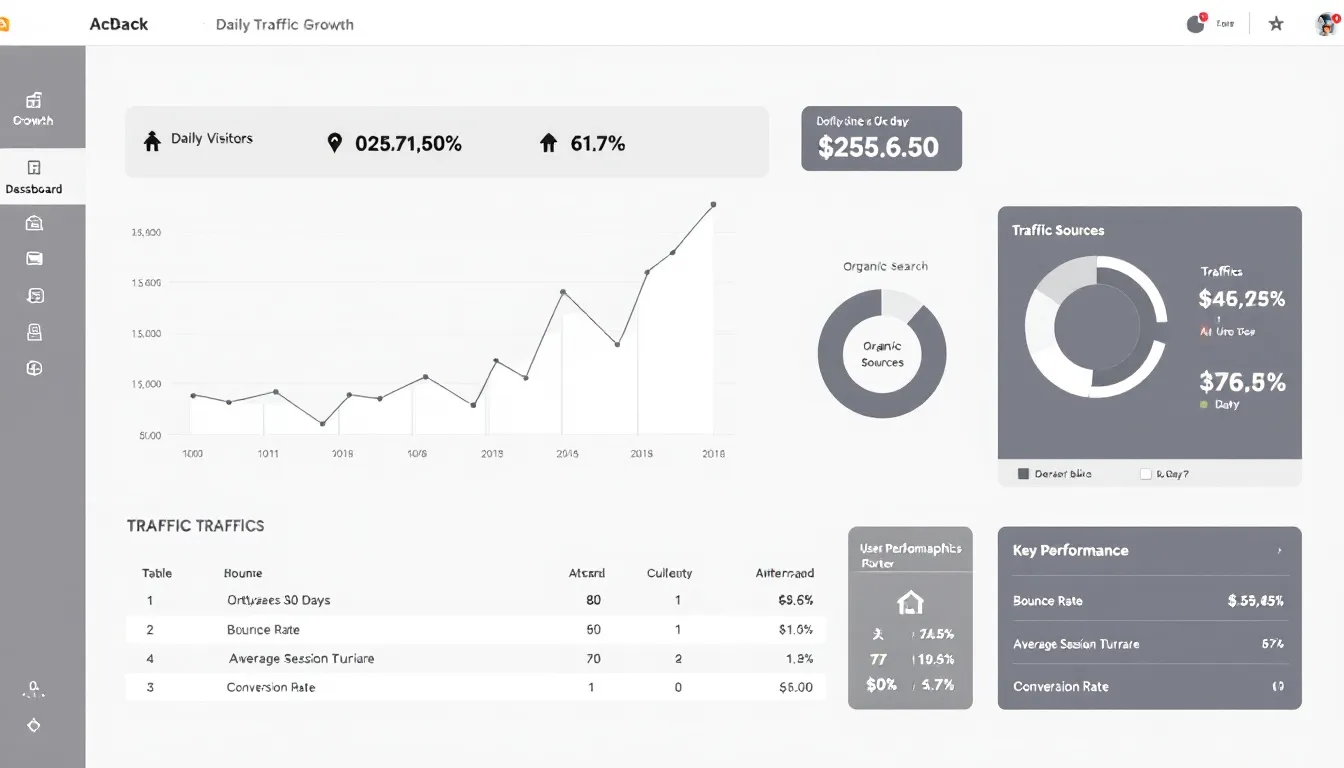The Complete Guide to SEO and Content Marketing Agencies in 2025
Key Takeaways
- SEO and content marketing agencies combine search optimization with strategic content creation to drive organic traffic and conversions
- These agencies typically offer services including keyword research, content strategy, technical SEO, link building, and performance analytics
- Monthly retainer fees range from $3,000 to $15,000 depending on scope, with proven agencies showing 200-500% traffic increases within 6-12 months
- Successful agencies use data-driven approaches, proprietary tools, and cross-channel integration to maximize ROI
- When choosing an agency, prioritize those with industry-specific experience, transparent reporting, and proven case studies in your sector
In today’s digital landscape, organic search drives over 53% of all website traffic, making search engine optimization and content marketing critical components of any successful business strategy. However, mastering these disciplines requires specialized expertise, cutting edge tools, and constant adaptation to evolving algorithms and consumer behaviors.
This comprehensive guide will help you understand what SEO and content marketing agencies do, how to evaluate potential partners, and what to expect from a successful collaboration. Whether you’re a small business looking to increase your online visibility or an enterprise seeking to scale your digital marketing efforts, this guide provides the insights you need to make informed decisions.

What is an SEO and Content Marketing Agency?
A specialized digital marketing firm that combines search engine optimization with strategic content creation to drive organic growth represents the evolution of traditional marketing agencies. These agencies bridge the gap between technical SEO implementation and high quality content that resonates with target audiences.
Unlike general digital marketing agency providers, SEO and content marketing agencies focus specifically on creating content that ranks well in search engines while simultaneously engaging and converting visitors. They understand that successful digital presence requires both technical expertise and creative storytelling capabilities.
Modern agencies integrate generative ai tools, advanced analytics, and multi-channel distribution strategies to maximize their clients’ online visibility and user engagement. The best agencies have evolved beyond traditional SEO tactics to include content-market fit validation and conversion optimization.
These specialized marketing agencies work with businesses across all industries, from local businesses seeking to improve their local SEO presence to enterprise companies requiring comprehensive digital marketing strategies. Their collaborative approach ensures that every piece of content serves both search engine requirements and business objectives.
Core Services Offered by SEO and Content Marketing Agencies
Strategic SEO Services
Contemporary SEO agencies provide comprehensive keyword research and competitive analysis using advanced tools like Ahrefs, SEMrush, and proprietary platforms. This foundation enables them to identify high-value opportunities and develop data-driven strategies that drive traffic and generate leads.
Technical SEO audits form another crucial component, covering site speed optimization, mobile compatibility, schema markup implementation, and Core Web Vitals improvements. These technical foundations ensure that search engines can effectively crawl and index website content while providing optimal user experiences.
Local SEO optimization helps businesses targeting geographic markets improve their visibility in location-based searches. This includes optimizing Google Business Profile listings, managing online reviews, and implementing location-specific content strategies that attract leads from specific service areas.
Link building campaigns focus on acquiring high-authority, relevant backlinks through manual outreach and relationship building. Quality agencies avoid automated link-building schemes and instead invest in creating authoritative sources and genuine partnerships that enhance domain authority.
Modern SEO strategy also includes AI-first optimization for emerging platforms like ChatGPT, Google Gemini, and other search technologies that are reshaping how potential customers discover businesses online.
Content Marketing Excellence
Content strategy development begins with comprehensive audience research and search intent analysis. Top content marketing agencies create detailed buyer personas and map content topics to specific stages of the customer journey, ensuring every piece of content serves a strategic purpose.
Content creation encompasses diverse formats including long-form articles, case studies, whitepapers, video scripts, and interactive media. Expert content marketers understand how different content types perform across various channels and can create content that drives results across multiple touchpoints.
Content distribution extends far beyond publishing blog posts on company websites. Leading agencies develop comprehensive distribution strategies that include social media marketing, email marketing campaigns, industry publications, and strategic partnerships that amplify content reach.
Content repurposing maximizes the value of existing assets by adapting them for different platforms and audiences. A single comprehensive blog post might become a video series, social media posts, email newsletter content, and a downloadable guide, multiplying its impact and ROI.
Editorial calendar management ensures consistent brand voice and messaging across all content touchpoints. This systematic approach helps maintain publishing schedules while ensuring all content aligns with broader marketing efforts and business objectives.

Integrated Marketing Services
Leading SEO and content marketing agencies often provide PPC campaign management that complements organic search strategies. By coordinating paid search and organic efforts, they can dominate search results and maximize visibility for high-value keywords.
Social media marketing with content amplification focus helps extend the reach of organic content while building brand communities. This integrated approach ensures that content created for SEO purposes also serves social media objectives and drives engagement across platforms.
Email marketing automation and lead nurturing campaigns help convert website traffic into qualified leads and customers. By integrating email marketing with content strategy, agencies can create sophisticated nurture sequences that guide prospects through the sales funnel.
Conversion rate optimization for landing pages and content assets ensures that increased traffic translates into measurable business results. This involves A/B testing, user experience optimization, and data analysis to continuously improve conversion performance.
Analytics and reporting provide actionable insights and ROI measurement that demonstrate the value of SEO and content marketing investments. Professional agencies use advanced attribution modeling to show how their efforts contribute to revenue growth and business objectives.
Benefits of Hiring an SEO and Content Marketing Agency
Access to specialized expertise and cutting edge tools provides immediate value that would cost $10,000+ annually to license independently. Marketing agencies invest in premium software, training, and certification programs that individual businesses often cannot justify.
Faster results through proven methodologies represent another significant advantage. Experienced agencies typically deliver measurable improvements within 90-180 days because they understand what works and can avoid common pitfalls that delay progress.
Scalable content production with dedicated content team members allows businesses to maintain consistent publishing schedules without overwhelming internal resources. Whether you need one blog post per week or daily content across multiple channels, agencies can scale their services to match your needs.
Staying current with algorithm updates and industry best practices eliminates the need for internal training costs and ensures your strategy remains effective as search engines evolve. This is particularly valuable given Google’s frequent updates and the complexity of modern SEO.
Objective outside perspective on brand messaging and market positioning often reveals opportunities that internal teams might miss. Fresh eyes can identify content gaps, messaging inconsistencies, and strategic opportunities that drive real growth.
Risk mitigation through white-hat practices and compliance with search engine guidelines protects your business from penalties that could devastate your online visibility. Professional agencies understand the boundaries and ensure all tactics are sustainable and ethical.
How to Choose the Right SEO and Content Marketing Agency
Evaluation Criteria
Review case studies showing specific traffic and revenue increases for similar businesses in your industry. Look for detailed examples that demonstrate not just traffic growth but actual business impact including lead generation and sales increases.
Verify agency certifications from Google, HubSpot, and other major platforms. While certifications don’t guarantee success, they indicate that the agency invests in staying current with best practices and platform updates.
Assess their own website’s SEO performance and content quality as proof of concept. An agency that cannot effectively market itself is unlikely to succeed with your business. Check their search engine rankings, content quality, and user experience.
Request references from current clients and check online reviews on platforms like Clutch and Google Business. Pay particular attention to reviews that mention specific results and long-term client relationships.
Evaluate their reporting capabilities and data transparency during initial consultations. Professional agencies should be able to clearly explain their measurement methods and provide examples of their reporting dashboards.

Red Flags to Avoid
Agencies promising guaranteed number one rankings or unrealistic timeline commitments should be avoided. No legitimate SEO agency can guarantee specific rankings because search engines control these outcomes through complex algorithms.
Lack of industry-specific experience or generic, one-size-fits-all approaches often indicate an agency that cannot provide the specialized knowledge your business needs. Look for agencies with demonstrated success in your sector.
Unwillingness to share specific strategies or provide detailed proposals suggests an agency that either lacks expertise or uses questionable tactics they don’t want to reveal. Transparent agencies are confident in their methods.
Focus solely on vanity metrics like website traffic without emphasis on conversions and ROI indicates an agency that doesn’t understand business objectives. Traffic means nothing if it doesn’t contribute to revenue growth.
Long-term contracts without performance milestones or exit clauses can trap you with underperforming agencies. Look for partnerships that include regular performance reviews and reasonable termination options.
Pricing Models for SEO and Content Marketing Services
Monthly Retainer Agreements
Small business packages typically range from $3,000-$7,500 per month and include basic SEO, content creation, and reporting. These packages are designed for businesses with limited budgets but serious growth ambitions.
Mid-market solutions cost $7,500-$15,000 per month and provide comprehensive strategies with dedicated account management. This level includes more sophisticated content strategy, advanced SEO tactics, and deeper analytics integration.
Enterprise-level services range from $15,000-$50,000+ per month for complex, multi-channel campaigns. These engagements often include multiple team members, custom technology solutions, and integration with broader marketing efforts.
Monthly retainers provide predictable costs and ongoing optimization but typically require minimum 6-12 month commitments. This model works best for businesses seeking sustained growth and continuous improvement.
Project-Based Pricing
SEO audits cost $2,500-$10,000 depending on website complexity and market analysis depth. These comprehensive assessments identify technical issues, content gaps, and strategic opportunities.
Content strategy development ranges from $5,000-$25,000 for comprehensive planning and implementation roadmaps. This includes audience research, competitive analysis, and detailed content calendars.
Website optimization projects cost $10,000-$50,000 for technical SEO overhauls and content migration. These intensive projects address fundamental issues that prevent effective SEO performance.
Project-based pricing is ideal for businesses with specific objectives or limited ongoing needs. However, SEO and content marketing typically require ongoing effort to maintain and improve results.
Performance-Based Models
Some agencies charge a percentage of attributed revenue increases or cost-per-acquisition improvements. This model aligns agency incentives with client success but requires sophisticated tracking systems.
Performance-based pricing is typically combined with base retainer fees to cover operational costs. Pure performance models are rare because they don’t account for the time and resources required to develop and implement strategies.
This approach is less common but growing among results-focused agencies that have confidence in their ability to drive measurable business outcomes. It requires clear attribution models and agreed-upon measurement methods.
What to Expect When Working with an Agency
Onboarding and Discovery Phase (Weeks 1-4)
The initial phase involves comprehensive website audits and competitor analysis to understand your current position and identify opportunities. Professional agencies use multiple tools and manual review to ensure nothing is missed.
Stakeholder interviews and business goal alignment ensure that the agency understands your objectives, target audience, and competitive landscape. This collaborative approach helps create strategies that align with your business priorities.
Historical data review and baseline metric establishment provide the foundation for measuring progress. Agencies will analyze your existing analytics data to understand traffic patterns, conversion rates, and user behavior.
Content asset inventory and gap analysis identify existing content that can be optimized and areas where new content is needed. This audit helps prioritize initial efforts and avoid duplicating existing resources.
Strategic roadmap development includes quarterly milestones and specific deliverables. Professional agencies create detailed project plans that outline timelines, responsibilities, and expected outcomes.
Implementation and Optimization (Months 2-6)
Technical SEO improvements and site architecture optimization address fundamental issues that may be limiting search engine performance. This includes speed optimization, mobile compatibility, and crawlability improvements.
Content creation and publication according to editorial calendars ensures consistent output aligned with SEO strategy. Professional content marketers create high quality content that serves both search engines and your target audience.
Link building outreach and relationship development focus on acquiring authoritative backlinks that improve domain authority. This manual process involves identifying relevant sites and building genuine partnerships.
Performance monitoring and strategy refinement based on data ensures that tactics are working and identifies opportunities for improvement. Regular analysis allows agencies to pivot quickly when needed.
Regular reporting provides actionable insights and recommendations for ongoing optimization. Professional agencies provide clear, understandable reports that show progress toward your business objectives.

Growth and Scaling Phase (Months 6+)
Advanced strategies including AI optimization and emerging platform integration help maintain competitive advantages as the digital landscape evolves. Forward-thinking agencies stay ahead of trends and implement new tactics before competitors.
Content repurposing and distribution channel expansion maximize the value of existing content while reaching new audiences. This systematic approach helps scale content impact without proportionally increasing production costs.
Conversion rate optimization and user experience improvements ensure that increased traffic translates into business results. Ongoing testing and refinement help maximize the value of every visitor.
Strategic pivots based on market changes and performance data keep strategies aligned with evolving business needs and market conditions. Flexible agencies adapt their approaches as needed to maintain effectiveness.
Long-term planning for sustained organic growth focuses on building lasting competitive advantages rather than short-term gains. The best agencies think strategically about long-term market positioning and sustainable growth.
Industry Trends and Future Outlook
AI integration has become standard practice with 73% of marketing agencies adopting AI tools by late 2024. However, the best agencies use AI to enhance human creativity rather than replace it, ensuring content remains authentic and valuable.
Voice search optimization is growing as smart speaker adoption reaches 35% of U.S. households. This trend requires new approaches to keyword research and content optimization that account for conversational search queries.
Video content is dominating digital marketing with YouTube becoming the second-largest search engine. Successful agencies are integrating video content creation and optimization into their broader content marketing strategies.
E-A-T (Experience, Expertise, Authoritativeness, Trustworthiness) factors are increasingly important for content rankings. Google’s emphasis on helpful content rewards agencies that focus on expert-authored, well-researched content.
Zero-click searches are rising to 64% of Google queries, requiring new content strategies that capture attention within search results. This trend is pushing agencies to optimize for featured snippets and other rich results formats.
Integration of SEO with broader customer experience and brand building initiatives reflects the maturation of digital marketing. The most successful agencies now view SEO and content marketing as part of comprehensive customer journey optimization.

Partner with Granat Design for Your SEO and Content Marketing Success
Granat Design combines creative excellence with data-driven SEO strategies to deliver measurable results for businesses across industries. Our integrated approach ensures that every aspect of your digital presence works together to attract leads, increase conversions, and drive real growth.
Our comprehensive services include SEO audits, strategic content planning, and conversion-focused web design that create synergies between technical optimization and user experience. We understand that successful digital marketing requires both technical expertise and creative excellence.
We specialize in helping businesses achieve sustainable organic growth through white-hat practices and innovative content strategies. Our team of SEO experts and content marketers stays current with the latest trends and algorithm updates to ensure your strategy remains effective.
With transparent reporting and dedicated account management, Granat Design ensures your investment in SEO and content marketing delivers lasting value. We believe in building long-term partnerships based on measurable results and continuous improvement.
Contact Granat Design today to discover how our expertise can transform your digital presence and drive meaningful business growth. Our team is ready to help you develop a custom strategy that aligns with your business objectives and budget.
Frequently Asked Questions
How long does it take to see results from SEO and content marketing?
Initial improvements in technical SEO metrics typically appear within 4-8 weeks as agencies address site speed, mobile optimization, and other foundational issues. However, meaningful traffic increases usually occur within 3-6 months for established websites as new content begins ranking and existing pages improve their search engine rankings.
Significant ranking improvements and sustained growth typically develop over 6-12 months as link building efforts mature and content marketing campaigns gain momentum. Content marketing results vary but lead generation improvements often show within 2-4 months as high quality content begins attracting and converting potential customers.
What’s the difference between an SEO agency and a content marketing agency?
SEO agencies focus primarily on technical optimization, keyword rankings, and search visibility through on page optimization, technical SEO improvements, and link building strategies. Content marketing agencies emphasize storytelling, audience engagement, and brand building through strategic content creation and distribution.
Hybrid SEO and content marketing agencies combine both approaches for comprehensive digital marketing that addresses technical requirements while creating engaging content that converts visitors into customers. The best results come from integrated strategies that align content quality with search optimization principles.
Should I work with a local agency or consider remote options?
Local agencies offer face-to-face meetings and better understanding of regional markets, which can be valuable for local businesses or companies targeting specific geographic areas. However, remote agencies often provide access to specialized expertise and competitive pricing that may not be available locally.
Industry expertise and proven results matter more than geographic location for most businesses. Many successful partnerships operate entirely remotely with strong communication protocols, regular video calls, and collaborative project management systems that ensure effective coordination.
How do I measure the ROI of SEO and content marketing services?
Track organic traffic growth, keyword ranking improvements, and conversion rate increases to measure direct SEO impact. Monitor lead quality metrics including cost-per-acquisition and customer lifetime value to understand the business value of increased visibility and traffic.
Measure brand awareness through direct traffic, branded search volume, and social mentions to capture the broader impact of content marketing efforts. Calculate revenue attribution using tools like Google Analytics 4 and marketing automation platforms to connect SEO and content marketing activities to actual sales and revenue growth.
What questions should I ask potential agencies during the selection process?
Request specific case studies from businesses similar to yours with quantified results including traffic increases, ranking improvements, and revenue impact. Ask about their approach to algorithm updates and how they adapt strategies to maintain effectiveness as search engines evolve.
Inquire about team structure, account management processes, and communication frequency to ensure you’ll receive adequate attention and support. Understand their content creation process and quality control measures to ensure they can produce high quality content that represents your brand effectively. Clarify reporting methods, key performance indicators, and how they handle underperforming campaigns to ensure transparency and accountability.
